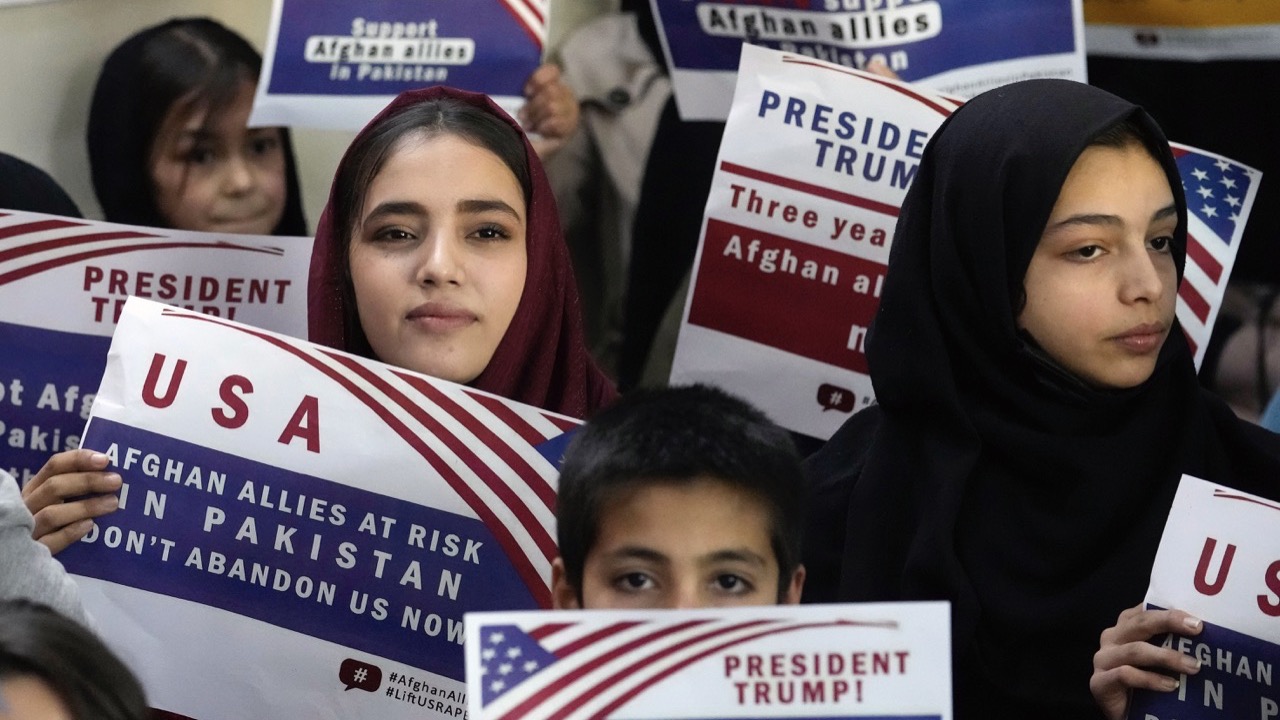UN agencies seek clarification from Pakistan on its decision to deport Afghan refugees awaiting relocation to the US and other countries. (AP/Anjum Naveed)

- UN agencies express concern over Pakistan's plan to deport Afghan refugees awaiting US relocation
- About 20,000 Afghans approved for US resettlement left in limbo after Trump pauses refugee programs
- UNHCR and IOM urge Pakistan to consider human rights standards in implementing relocation measures
Share
ISLAMABAD — The U.N. refugees and migration agencies on Wednesday expressed their concern over Pakistan’s decision to deport thousands of Afghan refugees awaiting relocation to the United States and elsewhere.
The U.N. refugee agency, UNHCR, and the International Organization for Migration in a statement said they were seeking clarification from Pakistan, which said last week it would deport the refugees back to Afghanistan unless their cases were processed quickly by the countries that had agreed to take them in.
Thousands of Afghans at Risk of Deportation
About 20,000 Afghans were approved for resettlement in the U.S. under a program that helps people at risk because of their work with the American government, media, aid agencies and rights groups. They were among tens of thousands of Afghans who fled to neighboring Pakistan after their country fell to the Taliban in 2021.
However, they were left in limbo after President Donald Trump paused U.S. refugee programs last month.
“A UNHCR-issued non-return advisory has been in place since 2021, calling for a suspension of forced returns of Afghan nationals from any country regardless of their status,” the joint UNHCR-IOM statement said.
Related Story: Denmark, Greece, Pakistan, Panama and Somalia Get Seats on the UN Security ...
Pakistan’s Deportation Plans
Pakistan’s Prime Minister Shehbaz Sharif last week gave the green light to evict Afghans without papers from the cities of Islamabad and Rawalpindi before March 31, in preparation for deportation if they were not relocated to their host countries.
UNHCR and IOM said they are especially concerned for Afghan nationals who face a risk of harm upon return, such as ethnic and religious minorities, women and girls, journalists, human rights activists, and members of artistic professions like musicians and others.
It said since Jan. 1, 2025, an uptick in arrests of Afghan nationals in Islamabad and Rawalpindi has caused significant distress, with reports of Afghan nationals of various documentation statuses being rounded up.
Related Story: Denmark, Greece, Pakistan, Panama and Somalia Get Seats on the UN Security ...
Impact of US Refugee Program Suspension
The Trump administration also announced the U.S. Refugee Admissions Program would be suspended from Jan. 27 for at least three months. It has shocked Afghans who were hoping to travel to the United States soon.
Afghans in Pakistan have been virtually living in hiding since 2023 when a crackdown began on foreigners who are in the country without proper documentation. An estimated 800,000 Afghans have either gone back voluntarily or been deported since despite criticism from U.N. agencies, rights groups and the Taliban.
UN Agencies Urge Consideration for Human Rights
Besides thousands of Afghans who are living in Pakistan and awaiting travel to host countries, there are around 1.45 million Afghan nationals registered with UNHCR as refugees in Pakistan as well but their stay has been extended until June.
In the statement, UNHCR and IOM urged “Pakistan to implement any relocation measures with due consideration for human rights standards, including due process, and the legal status of Proof of Registration (POR) and Afghan Citizen Card (ACC) holders, who have resided in Pakistan for an extended period of time”.
“Pakistan has a proud tradition of hosting refugees, saving millions of lives. This generosity is greatly appreciated,” UNHCR representative in Pakistan Philippa Candler said.
“IOM is committed to work with the Government of Pakistan and UNHCR to develop a mechanism to register, manage and screen Afghan nationals in Pakistan,” said IOM Chief of Mission, Mio Sato.
She said “This will open the door to tailored solutions including international protection to those in need and pathways for Afghan nationals, with long-standing socioeconomic and family ties in the country.”
RELATED TOPICS:
Categories

Teen Arrested at Visalia Mall After Firearm Report

Tumblr Goes Down for Thousands, Downdetector Reports
















